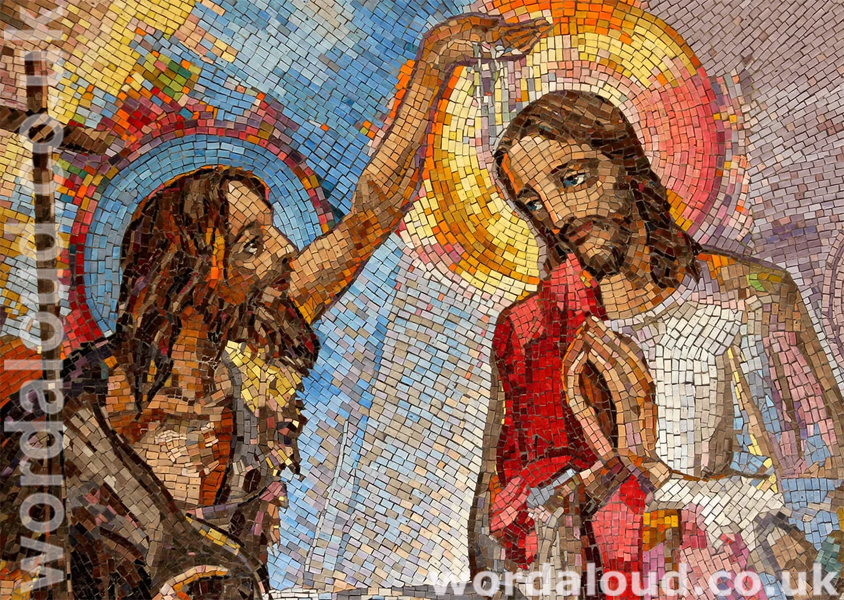Christian Art | Lord Of The Sabbath | Pray The Gospels | King James Audio Bible KJV
Luke 6: 1-5 – Week 22 Ordinary Time, Saturday (King James Audio Bible KJV, Spoken Word)
1 AND it came to pass on the second sabbath after the first, that he went through the corn fields; and his disciples plucked the ears of corn, and did eat, rubbing them in their hands.
2 And certain of the Pharisees said unto them, Why do ye that which is not lawful to do on the sabbath days?
3 And Jesus answering them said, Have ye not read so much as this, what David did, when himself was an hungred, and they which were with him;
4 How he went into the house of God, and did take and eat the shewbread, and gave also to them that were with him; which it is not lawful to eat but for the priests alone?
5 And he said unto them, That the Son of man is Lord also of the sabbath.
The Sabbath day, Saturday, was established by God in order to allow the Jewish people a special time to worship, and so therefore to fulfil their purpose and the highest good on Earth, which is to worship God. The Law was established through Moses following upon the release from Egypt, during which time of punishment the people had been prevented from worshipping God. Clearly, God wants us to have time to worship. It is sin when people prevent other people from having such time. This is central to our belief as Christians. The Lord’s Day, Sunday, is sacrosanct. It is our best opportunity in a busy and difficult world to give time to God.
The Pharisees know some of this, as it were in theory. In today’s Gospel verses, the Pharisees are shown to have the letter of the Law, but rather lack understanding as to the heart of God’s intentions for man. Indeed, their elaboration of the list of prohibited activities may have obscured for them the central fact of worship. It is pure casuistry on the part of the Pharisees as they claim to see plucking ears of corn as being the same as harvesting and crushing them as being the same as milling – two types of agricultural work forbidden on the Sabbath.
In responding to the Pharisees, Jesus suggests his own legal descent from David, and so the prophecies concerning the Messiah, and more than this suggests that as he walks through the fields with his disciples, the ground he occupies is holy – the bread of the Presence is here, the new Temple is here. This flows into Jesus’ declaration that ‘the Son of man is Lord also of the Sabbath’. This is self-revelation, unmistakeably so. Jesus is revealing himself as God the Son. It is to Jesus that the Sabbath is oriented.
Concluding Prayer | Love Revealed By Jesus Christ
Let us praise you, Lord,
with voice and mind and deed:
and since life itself is your gift,
may all we have and are be yours.
We make our prayer through our Lord.

![]()
King James Audio Bible | Endnotes
What Does Jesus Mean When He Speaks Of King David On The Sabbath Day?
In Luke 6:1-5, Jesus and his disciples were walking through a grain field on the Sabbath day when the disciples began to pluck and eat the grain. The Pharisees, who were present, accused Jesus of breaking the Sabbath law. In response, Jesus reminded them of an incident in the Old Testament where David and his men ate the showbread in the temple, which was not lawful for anyone except the priests to eat.
This reference to David in Luke 6:1-5 is significant because it challenges the Pharisees’ legalistic interpretation of the Sabbath law. Jesus is essentially saying that the law is not absolute and that there are certain circumstances where it can be broken in order to meet a greater need.
The incident that Jesus refers to is recorded in 1 Samuel 21:1-6. David and his men were on the run from King Saul and were in need of food. They went to the tabernacle and asked the priest for bread. The only bread available was the showbread, which was placed on the table in the holy place and was reserved for the priests to eat. Nevertheless, the priest gave the bread to David and his men, and they ate it.
This incident was significant because it showed that there were times when it was permissible to break the law in order to meet a greater need. David and his men were hungry and in need of food, and the showbread was the only bread available. The priest recognized their need and gave them the bread even though it was not lawful for them to eat it.
Jesus’ reference to this incident was meant to show the Pharisees that their legalistic interpretation of the Sabbath law was misguided. The Sabbath law was meant to promote rest and worship, but it was not meant to be a burden or a hindrance to meeting the needs of others. Jesus’ actions on the Sabbath were motivated by his love for his disciples and his desire to meet their needs, just as David’s actions were motivated by his need for food.
Jesus’ reference to David also highlights his own identity as the Messiah, who was prophesied to be a descendant of David. In Matthew 22:41-46, Jesus asks the Pharisees: ‘What do you think about the Christ? Whose son is he?’ They reply: ‘The son of David.’ Jesus then quotes Psalm 110:1, which refers to the Messiah as David’s Lord, and asks how David could call him Lord if he was his son. This exchange emphasizes the fact that the Messiah was not merely a physical descendant of David, but also his Lord and superior.








